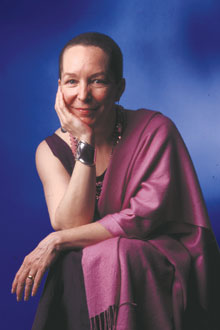
Pearl Cleage is best known for her novels "What Looks Like Crazy on an Ordinary Day" and "Babylon Sisters." Photo by Albert Trotman.
Pearl Cleage, the nationally recognized playwright, poet, novelist, social activist and Atlanta resident, has placed her papers at Emory University's Manuscript, Archives and Rare Book Library. The collection is now open to researchers.
"Pearl Cleage exemplifies the creative life," says Rosemary Magee, vice president and secretary of Emory University. "Her stories, poems and plays all display the imaginative interplay of lives in search of meaning. It is indeed an honor to have her papers at Emory."
Randall K. Burkett, Emory's curator of African American collections, says the acquisition of Cleage's papers "adds luster to our holdings of brilliant African American women writers, artists and activists. These include such talented individuals as Camille Billops, Elaine Brown, Lucille Clifton, Doris Derby, Samella Lewis, Louise Thompson Patterson, Mildred Thompson and Alice Walker. Cleage fits well in this pantheon of leading creative figures of the 20th and 21st centuries."
Cleage said she decided to place her papers with MARBL at Emory for several reasons, including prior discussions with the late Emory professor Rudolph Byrd, a MARBL supporter, and with Burkett.
"I really appreciated the way [Burkett] approached collecting African American material as an integral part of American culture,"she says, adding that she felt "Emory was a place that would value the work that I've done and make the papers available in a way that would make it productive to place them there."
She grew up in Detroit in a household committed to social justice and political activism. Her father, Albert B. Cleage Jr., who was ordained in the Congregational Church in 1943, later founded the Shrine of the Black Madonna, a religious institution that continues to have a national presence.
The powerful vision of peace and justice learned from her parents continues to inform her work. Paul Carter Harrison, her former mentor at Howard University, writes that Cleage has demonstrated "a capacity to investigate a diversity of social landscapes of America... with an insightful, unwavering commitment to alter the status quo."
As Cleage herself wrote early in her career, "I purposefully people my plays with fast-talking, quick-thinking black women... It is my firm belief that exposing my audiences to these... Feminist Warriorwomen... will quicken the swelling of our ranks."
Cleage has had a multi-faceted career as educator, speechwriter, journalist, novelist, poet and playwright. Her papers include writings, correspondence, printed material, photographs and audiovisual material. Manuscript and typescript drafts of her writings will enable scholars to see the formation of her craft.
Of special interest will be letters written to her father, mother and other family members from the time she enrolled at Howard University in 1967 and continuing through the 1980s. The collection includes rare issues of her family-edited biweekly, Illustrated News, as well as a complete set of the periodical Catalyst: A Magazine of Heart and Mind, of which she was the founder and editor. The collection also includes extensive documentation of her long collaboration with her husband, writer Zaron W. Burnett Jr.
Cleage is best known for her novels "What Looks Like Crazy on an Ordinary Day"(an Oprah Book Club selection) and "Babylon Sisters,"both of which are being adapted for film, as well as for her plays "Blues for an Alabama Sky"and "Flyin' West."An Atlanta resident, Cleage earned a bachelor's in drama from Spelman College in 1969.
Her latest theatrical production, "What I Learned in Paris,"is running Sept. 5-30 at Atlanta's Alliance Theatre, where she is in residence as its first artist in dialogue.
